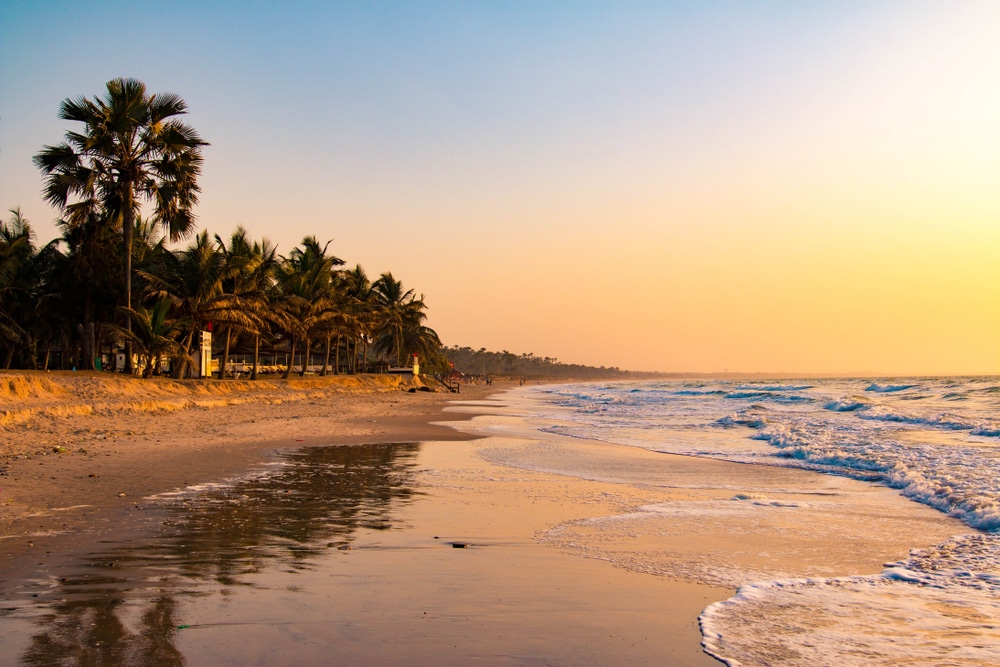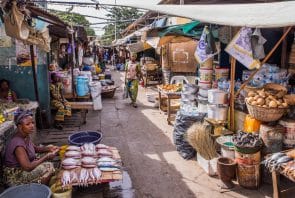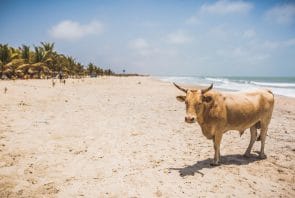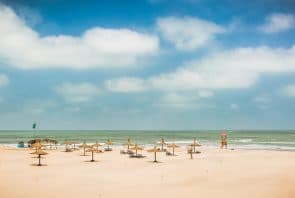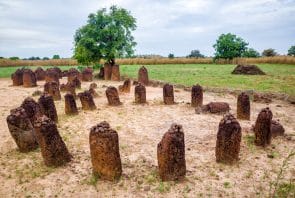Gambia, on the west coast of Africa, is often not perceived as a travel destination. Wrongly, because the short distances and many natural beauties make the country an excellent holiday destination. In addition, there is the good security situation.
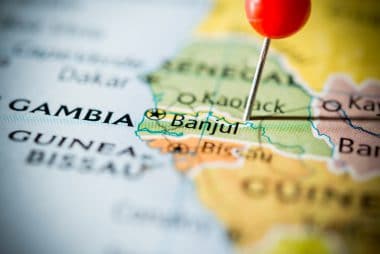
Geography & Location
With two million inhabitants and an area of only 11,000 square kilometres, The Gambia is the smallest country in Africa. It is completely surrounded by Senegal and is located around the eponymous Gambia River, which flows into the Atlantic Ocean.
The climate is generally hot and tropical, which is why the best time to travel is between November and March, outside the rainy season. Due to the extensive wet savannahs, forests and extensive swamps, the Gambia is very species-rich despite its small size, this is especially true for birds and amphibians. There are also various species of monkeys, bushbucks and reptiles, of which crocodiles and monitor lizards are the most impressive. Hippos and dolphins can be observed on boat tours.
The Gambia – Arrival and exercise on site
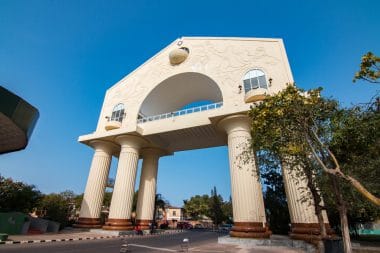
Entry to The Gambia is possible with a passport. A free visa is issued on site, which is valid for three or four weeks. The international airport is located near the capital Banjul. Some airlines offer direct flights, for example from Frankfurt . However, a stopover is more common, usually in Madrid, Amsterdam or Casablanca.
Getting around is possible by bus or rental car. The German and international driving licences are required for this. The road situation varies, but mostly good by African standards. The new bridge over the Gambia between Farafenni and Soma is also interesting. It is subject to tolls, but saves long waiting times when using the ferry service.
Attractions in The Gambia
The main reason for a trip is the species-rich nature and the beautiful beaches of Gambia. Despite its small size, The Gambia has three national parks and four other large protected areas. Kiang West and Kiumi National Parks can be visited. Kiang West National Park is the largest among them and can be explored both by car and on foot. It mainly includes savannah and extensive gallery forests. The Niuma National Park is located on the coast on the border with Senegal, it mainly contains mangrove populations.
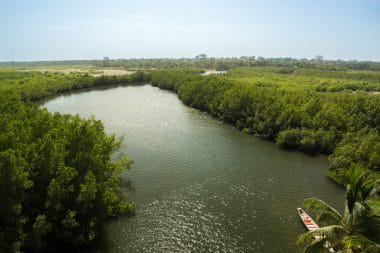
The most popular and easiest to visit is the Abuko Nature Reserve, not far from Banjul. In addition to rams, porcupines, snakes and various species of monkeys, there are also enclosures with lions and hyenas. Near Tanji is the Tanji Bird Reserve, a bird sanctuary that stretches around a lagoon. The two wetland protected areas Tanbi Wetland Complex and Bao Bolong Wetland Reserve are best explored by boat, otherwise the terrain is too impassable – this is also a great way to observe the countless bird species.
Relaxation is provided by the many fairytale beaches, in the vicinity of which you can find accommodation for different budgets. A good tip, for example, is the area around Kololi. If you want to get a glimpse into the dark past of colonization and slavery, you should visit Kunta Kinteh Island, a UNESCO World Heritage Site. There you can visit the remains of an old fort.
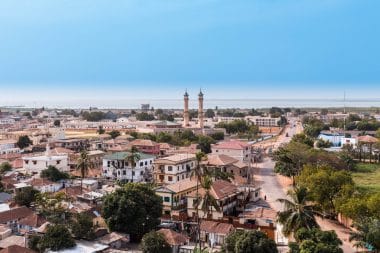
In addition to the natural beauties, there are also some exciting sights in the larger cities. In Banjul, the National Museum displays many exhibits from both the colonial and recent history of the country. A walk to the impressive Arc de Triomphe, the landmark of Gambia, is also recommended. It’s also worth taking a trip to Albert Market, an exciting street market that’s great for shopping.
In the region of Kombo-St. Mary there are many settlements and hotel complexes. Here, in addition to a number of mosques and churches, gardens can be visited. The most beautiful among them is the Botanical Garden near Bakau. Also there is the Sacred Crocodile Pool of Kachikally, an important cultural site. Locals and tourists are allowed to touch the crocodiles native here, as this is said to bring good luck. In Serekunda, the largest city with over 360,000 inhabitants, a visit to the St. Charles Lwanga Church with its magnificent painting of the interior is recommended.
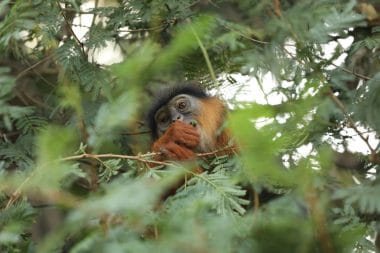
A special feature is drumming on the djembe, a West African standing drum. Interested parties can book a course on site in which they can learn to use the musical instrument. Both this and the country’s artistic wood carvings offer themselves as beautiful souvenirs and thus support regional craftsmanship.
Food & Drink
The local cuisine consists of an interesting mix of West African and Arabic dishes. Since almost every place is close to the river or the coast, fish dishes are widespread and can be found in great variety. Starchy vegetables such as sweet potatoes, cassava and rice are processed and eaten as a side dish. One of the most important dishes is Chicken Yassa, a pickled chicken.
Juices made from mango, guava or dried hibiscus flowers, for example, are popular. Tea is also very common, especially the regional Kinkéliba tea and Ataya, also a green tea, are drunk. Since most ethnic groups are Muslims, alcohol is not commonly found. However, the country has its own small brewery, Banjul Breweries – it produces several types of beer. Palm wine is also occasionally offered.
Particularities
The atmosphere on the ground is considered very tolerant and hospitable, and the country has also been completely spared terrorist attacks so far. Nevertheless, politeness dictates that you choose your clothing with restraint. Nude bathing on the beach is uncommon throughout Africa and can also lead to alienation or difficulties with the local law enforcement officers in The Gambia.
For the right vaccination protection, it makes sense to consult a tropical physician or at least your family doctor before traveling. Basically, good mosquito protection and also the intake of malaria prophylaxis are necessary.
More impressions from The Gambia
Können wir Ihnen helfen?
Benötigen Sie Unterstützung bei Ihrer Reiseplanung oder weitergehende Informationen zu einzelnen Reisezielen? Wir freuen uns über Ihre Kontaktaufnahme.


